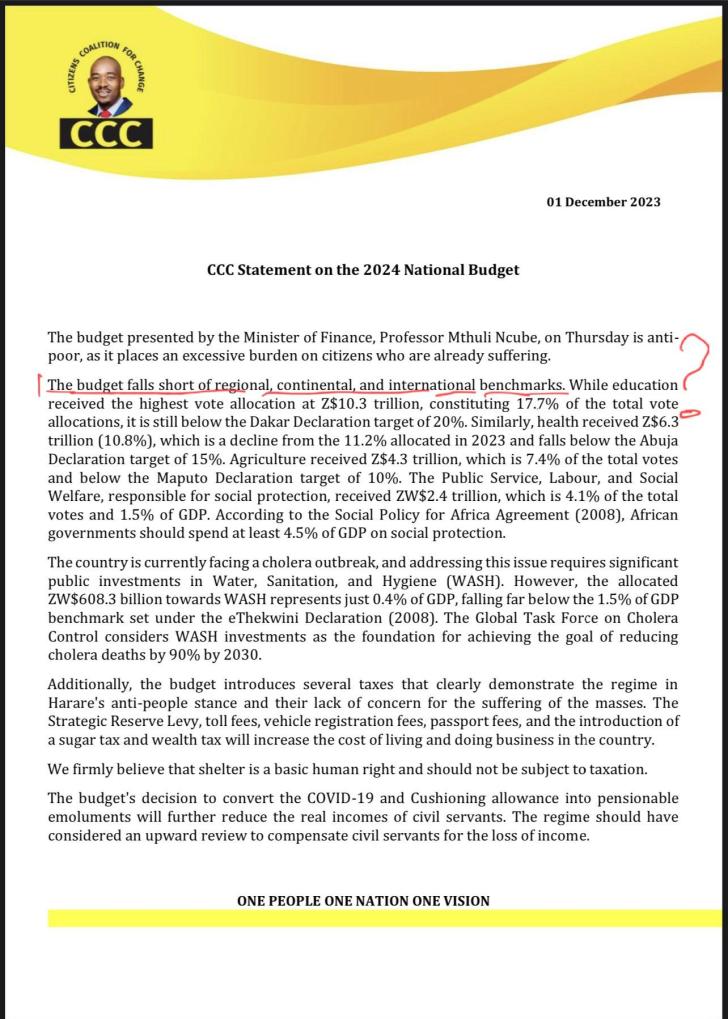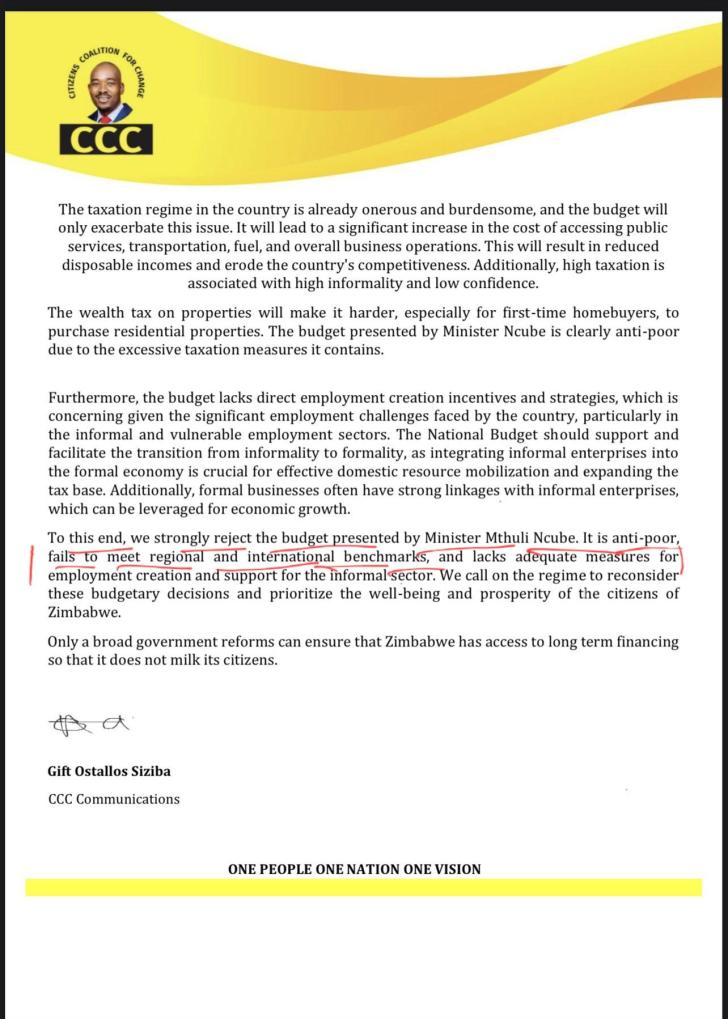Opinion / Columnist
Chamisa's CCC borrows poor language from Nerves Mumba
03 Dec 2023 at 18:23hrs |
384 Views
IN A WHAT COMES ACROSS AS A POOR CASE OF BORROWING poor language from Nerves Mumba's controversial Sadc Electoral Observation Mission on Zimbabwe's 2023 harmonised general election, Nelson Chamisa's CCC party has issued a shocking and embarrassing statement, signed by Gift Ostallos Siziva, on the 2024 National Budget Speech presented in Parliament yesterday by the Minister of Finance, Economic Development and Investment Promotion, Prof Mthuli Ncube.
In an astonishing conclusion rejecting the budget, which is emblematic of the party's lack of thought leadership and nuance, absence of structural capacity and lack of requisite skills; the statement, a copy of which is attached, claims that:
"The budget falls short of regional, continental, and international benchmarks."
For ease of reading, the full statement is reproduced below:
CCC Statement on the 2024 National Budget
01 December 2023
The budget presented by the Minister of Finance, Professor Mthuli Ncube, on Thursday is anti- poor, as it places an excessive burden on citizens who are already suffering.
The budget falls short of regional, continental, and international benchmarks. While education received the highest vote allocation at Z$10.3 trillion, constituting 17.7% of the total vote allocations, it is still below the Dakar Declaration target of 20%. Similarly, health received Z$6.3 trillion (10.8%), which is a decline from the 11.2% allocated in 2023 and falls below the Abuja Declaration target of 15%. Agriculture received Z$4.3 trillion, which is 7.4% of the total votes and below the Maputo Declaration target of 10%. The Public Service, Labour, and Social Welfare, responsible for social protection, received ZW$2.4 trillion, which is 4.1% of the total votes and 1.5% of GDP. According to the Social Policy for Africa Agreement (2008), African governments should spend at least 4.5% of GDP on social protection.
The country is currently facing a cholera outbreak, and addressing this issue requires significant public investments in Water, Sanitation, and Hygiene (WASH). However, the allocated ZW$608.3 billion towards WASH represents just 0.4% of GDP, falling far below the 1.5% of GDP benchmark set under the eThekwini Declaration (2008). The Global Task Force on Cholera Control considers WASH investments as the foundation for achieving the goal of reducing cholera deaths by 90% by 2030.
Additionally, the budget introduces several taxes that clearly demonstrate the regime in Harare's anti-people stance and their lack of concern for the suffering of the masses. The Strategic Reserve Levy, toll fees, vehicle registration fees, passport fees, and the introduction of a sugar tax and wealth tax will increase the cost of living and doing business in the country. We firmly believe that shelter is a basic human right and should not be subject to taxation. The budget's decision to convert the COVID-19 and Cushioning allowance into pensionable emoluments will further reduce the real incomes of civil servants. The regime should have considered an upward review to compensate civil servants for the loss of income.
The taxation regime in the country is already onerous and burdensome, and the budget will only exacerbate this issue. It will lead to a significant increase in the cost of accessing public services, transportation, fuel, and overall business operations. This will result in reduced disposable incomes and erode the country's competitiveness. Additionally, high taxation is associated with high informality and low confidence.
The wealth tax on properties will make it harder, especially for first-time homebuyers, to purchase residential properties. The budget presented by Minister Ncube is clearly anti-poor due to the excessive taxation measures it contains.
Furthermore, the budget lacks direct employment creation incentives and strategies, which is concerning given the significant employment challenges faced by the country, particularly in the informal and vulnerable employment sectors. The National Budget should support and facilitate the transition from informality to formality, as integrating informal enterprises into the formal economy is crucial for effective domestic resource mobilization and expanding the tax base. Additionally, formal businesses often have strong linkages with informal enterprises, which can be leveraged for economic growth.
To this end, we strongly reject the budget presented by Minister Mthuli Ncube. It is anti-poor, fails to meet regional and international benchmarks, and lacks adequate measures for employment creation and support for the informal sector. We call on the regime to reconsider these budgetary decisions and prioritize the well-being and prosperity of the citizens of Zimbabwe.
Only a broad government reforms can ensure that Zimbabwe has access to long term financing so that it does not milk its citizens.


Gift Ostallos Siziba
CCC Communications
ONE PEOPLE ONE NATION ONE VISION
In an astonishing conclusion rejecting the budget, which is emblematic of the party's lack of thought leadership and nuance, absence of structural capacity and lack of requisite skills; the statement, a copy of which is attached, claims that:
"The budget falls short of regional, continental, and international benchmarks."
For ease of reading, the full statement is reproduced below:
CCC Statement on the 2024 National Budget
01 December 2023
The budget presented by the Minister of Finance, Professor Mthuli Ncube, on Thursday is anti- poor, as it places an excessive burden on citizens who are already suffering.
The budget falls short of regional, continental, and international benchmarks. While education received the highest vote allocation at Z$10.3 trillion, constituting 17.7% of the total vote allocations, it is still below the Dakar Declaration target of 20%. Similarly, health received Z$6.3 trillion (10.8%), which is a decline from the 11.2% allocated in 2023 and falls below the Abuja Declaration target of 15%. Agriculture received Z$4.3 trillion, which is 7.4% of the total votes and below the Maputo Declaration target of 10%. The Public Service, Labour, and Social Welfare, responsible for social protection, received ZW$2.4 trillion, which is 4.1% of the total votes and 1.5% of GDP. According to the Social Policy for Africa Agreement (2008), African governments should spend at least 4.5% of GDP on social protection.
The country is currently facing a cholera outbreak, and addressing this issue requires significant public investments in Water, Sanitation, and Hygiene (WASH). However, the allocated ZW$608.3 billion towards WASH represents just 0.4% of GDP, falling far below the 1.5% of GDP benchmark set under the eThekwini Declaration (2008). The Global Task Force on Cholera Control considers WASH investments as the foundation for achieving the goal of reducing cholera deaths by 90% by 2030.
Additionally, the budget introduces several taxes that clearly demonstrate the regime in Harare's anti-people stance and their lack of concern for the suffering of the masses. The Strategic Reserve Levy, toll fees, vehicle registration fees, passport fees, and the introduction of a sugar tax and wealth tax will increase the cost of living and doing business in the country. We firmly believe that shelter is a basic human right and should not be subject to taxation. The budget's decision to convert the COVID-19 and Cushioning allowance into pensionable emoluments will further reduce the real incomes of civil servants. The regime should have considered an upward review to compensate civil servants for the loss of income.
The taxation regime in the country is already onerous and burdensome, and the budget will only exacerbate this issue. It will lead to a significant increase in the cost of accessing public services, transportation, fuel, and overall business operations. This will result in reduced disposable incomes and erode the country's competitiveness. Additionally, high taxation is associated with high informality and low confidence.
The wealth tax on properties will make it harder, especially for first-time homebuyers, to purchase residential properties. The budget presented by Minister Ncube is clearly anti-poor due to the excessive taxation measures it contains.
Furthermore, the budget lacks direct employment creation incentives and strategies, which is concerning given the significant employment challenges faced by the country, particularly in the informal and vulnerable employment sectors. The National Budget should support and facilitate the transition from informality to formality, as integrating informal enterprises into the formal economy is crucial for effective domestic resource mobilization and expanding the tax base. Additionally, formal businesses often have strong linkages with informal enterprises, which can be leveraged for economic growth.
To this end, we strongly reject the budget presented by Minister Mthuli Ncube. It is anti-poor, fails to meet regional and international benchmarks, and lacks adequate measures for employment creation and support for the informal sector. We call on the regime to reconsider these budgetary decisions and prioritize the well-being and prosperity of the citizens of Zimbabwe.
Only a broad government reforms can ensure that Zimbabwe has access to long term financing so that it does not milk its citizens.


Gift Ostallos Siziba
CCC Communications
ONE PEOPLE ONE NATION ONE VISION
Source - X
All articles and letters published on Bulawayo24 have been independently written by members of Bulawayo24's community. The views of users published on Bulawayo24 are therefore their own and do not necessarily represent the views of Bulawayo24. Bulawayo24 editors also reserve the right to edit or delete any and all comments received.
Join the discussion
Loading comments…




























